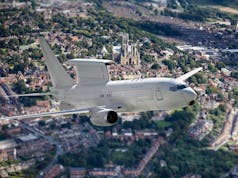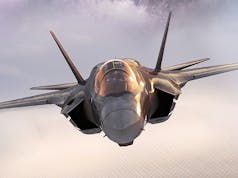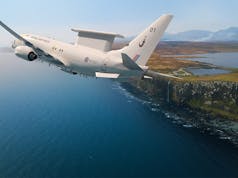NATO has inaugurated the Ramstein Flag 24 exercise, a sophisticated multi-domain tactical event set to take place from September 30 to October 11, 2024, in Greece’s West Peloponnese.
This latest addition to Allied Air Command’s exercise portfolio aims to strengthen air, maritime, and land defence tactics among 13 allied nations.
Ramstein Flag 24, say the Alliance, is designed to address realistic and complex operational challenges, reflecting NATO’s commitment to evolving its exercise regimen in response to changing geopolitical tensions.
The exercise integrates theory with practical field training, providing a platform to test high-end air defence tactics.
This year, which marks the 75th anniversary of NATO, the exercise will focus on Counter Anti-Access/Area Denial (C-A2/AD) and Integrated Air and Missile Defence (IAMD) strategies.
Over 140 allied aircraft, including fighters and support units, will participate alongside maritime, land, and special operations forces.
General James B. Hecker, Commander of Allied Air Command, said: “As geopolitical tensions continue to evolve, so too must NATO exercise design. Ramstein Flag signifies the future of NATO exercises, focusing on current and future threats,” he stated.
Ramstein Flag 24 not only tests tactical air defence measures but also allows NATO nations to refine their Ballistic Missile Defence (BMD) strategies.
The primary goal of this exercise is to enhance cooperation, interoperability, and integration among NATO members, demonstrating the alliance’s resolve and capability to deter and defend against potential adversaries through coordinated multi-domain operations.














Sorry, poorly written piece. Obvious question (unless I have word blindness), which 13 NATO nations?
If the NATO announcement doesn’t say and this is reporting the announcement, it isn’t going to say either. I’d think most of the main players in Central Europe can be seen by looking at Ramstein itself.
“Ramstein is home to 21 other NATO countries as well [as the US], with German, Canadian, British, French, Belgian, and Dutch forces making up the bulk of them.”
So that’s 7 likely contenders.
Next we know Greece is hosting this year and Turkey’s invitation made the news, so there’s two more. Given its size and proximity to Greece, you have to figure Italy. Spain is less certain, but I’d think marginally more likely than not given their presence in Romania. We are up to 11 probables.
Perhaps we’ll get some Nordic involvement to round out the numbers. Sweden and Norway? That’s my guess. Polish and Romanian F-16s were bubbling under for my top 13 guesses. There was also some speculation last year that Ukraine will be invited; while they aren’t a NATO nation, the wording does say allied nations….
Thank you
“Ramstein Flag 24 not only tests tactical air defence measures but also allows NATO nations to refine their Ballistic Missile Defence (BMD) strategies.”
I guess UK will opt out of this bit, as we’ve got no discernable BMD defences to refine… only sayin’…
Not sure about that, although the UK has as far as I am aware no anti ballistic missiles we do have some of the major NATO BMD radar sites. So a lot of co-ordination work will happen.
What I would like to see is the same type of exercise at sea for carrier strike against an enemy surface action group, an enemy carrier group and penetration of an enemy coast. Still wonder if the old Buccaneer flying a 50ft and 500knts could even today get the strike home. Yes they did fly that low only look up Red Flag Ex 1977/78/79. They were flying so low that one even clipped a telegraph pole at about the 39ft mark. I even remember working on some of the German telecom towers, sitting on the edge of the antenna platforms at 300ft and watching the RAF fly below me as they used the tower in Uelzen as a nav point.
radars have gotten much better at finding low flying targets. with AWACs and AESA, and other systems- low flying cruise missiles are easy targets for the UK and US- see what happened in irans attack and how the houthis have been doing- they’ve launched dozens of cruise missiles at western and israeli targets without a hit. they are constantly shot down. buccaneers simply wouldn’t stand a chance against modern western systems. russia seems to still be having a massive amount of trouble defending from these sort of attacks though lol.
T45 has a limited capability that will be improved in the next few years.
Less limited than the Russian weapons fortunately!
There is an article in the Torygraph claiming it would cost £10Bn to have a defensive missile system.
I don’t understand how having a containerised Land Ceptor system at major bases and strategic points would cost a fraction of that. Combine that with ASTER-SAM-PT in a few locations and you have a pretty handy system.
I agree. It’s easier to scale up what we’ve got than develop something new. Sky Sabre should be deployed to the fast jet airbases and to Brize Norton at the minimum. Maybe let the RAF operate these new batteries and let them integrate into UK integrated air defence. The RAF regiment should also have it’s air defence role reinstated through the introduction of some mobile, radar operated gun based system.
There’s no reason apart from funding why the Royal Navy couldn’t have a shore-based Aster-15/30 capability protecting Portsmouth, Plymouth and Faslane. They’re already skilled in operating it and they already have a stock of missiles in store.
How about this for an idea? Since the RN is moving to using MK 41 launchers for future ships why not start the process early. When Type 45’s come in for refit replace their Sylver launchers with MK41’s. Then later on when Type 45’s start being decommissioned move the Mk41’s onto the Type 83s who were going to get them anyway.
With the Sylvers you’ve prematurely replaced you can install them into shore-based silos for the protecting UK critical areas.
It’s a win-win. You enhance the capability of the Type 45s and you get 6x 48 Sylver launchers for GBAD.
Just buying Sky Sabre for the bases and leaving the T45s on Sylvers is a lot less faff, risk and cost.
I agree it is a lot less faff to just buy more Sky Sabre. However Aster has got a longer range/reach, it will a future ABM capability and there is an existing training pipeline for it. It would seem to be easier to expand Aster than introduce a new system such as Patriot.The Type 45’s are already due a refit for installing CAMM and I would just piggy back the SYLVER replacement onto that work.